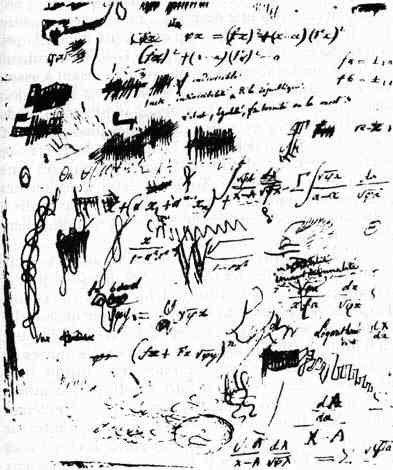A famous mathematician, G. H. Hardy, wrote in his 1940 memoir, A Mathematician’s Apology, “No mathematician should ever allow himself to forget that mathematics, more than any other art or science, is a young man’s game.” For centuries it has been a commonly accepted belief that youth is most important ingredient for greatness in Mathematics. Think of the young John Nash in A Beautiful Mind, discovering the Nash equilibrium in a smoky bar, or the aged mathematician in Proof who “revolutionized the field twice before he was twenty-two.”
Another example is my personal favorite, French mathematician Évariste Galois. He was responsible for Galois theory, an important branch of abstract algebra. He came up with this while also becoming a political activist, serving a 9-month jail sentence, and having an affair with a physician’s daughter. And he accomplished all of this before he was killed in a duel at the age of 21! Here is a copy of the notes Galois made the night before his death outlining his mathematical ideas and discoveries.
Albert Einstein formulated his most famous equation, E=mc2, when he was 26.
Norwegian mathematician Niels H. Abel solved a 300-year-old problem and discovered what are now known as Abelian functions. He died of tuberculosis at age 26.
We can look at some more recent examples:
Ruth E. Lawrence started college at the University of Oxford when she was 12 and received a bachelor’s degree in mathematics at age 13. She earned her doctorate at 17, went on to prestigious postdoctoral positions at Harvard, and landed her first faculty job at 22.
Terence Tao, Australian-American mathematician, received his Ph.D. from Princeton University at the age of 20 and by the age of 24 he was a full-time professor at UCLA (University of California, Los Angeles).
There are a couple of reasons behind this age phenomenon. For starters, mathematics is one of the few fields in which one can do top-level work without a lot of life experience. It is believed that doing great mathematics requires a lot of energy and it is really physically draining like a lot of sports and people usually have lesser responsibilities and more energy when they are young.
Because mathematicians can make great discoveries at a young age, they also receive awards and become highly visible as young people. In fact, the Fields Medal, the “Nobel prize for mathematics” stipulates that winners must be 40 or younger.
But it’s becoming less and less true that mathematicians do their best work when they’re young. The problem is that it now takes longer and longer for mathematicians to learn enough about their field to reach the important problems.

Wow. I never realized how young such extraordinary mathematicians were when they had their flash of genius. Great post, thought provoking 😀
It is amazing isn’t it! It kind of supports the idea that some people are just born with “it”
I do not agree that all important Mathematical discoveries have been made at an early age.
Pingback: Passing your prime | Hearten Soul
Pingback: Brain Decline Is Obsolete... If You Want To Train! - Insanity Mind